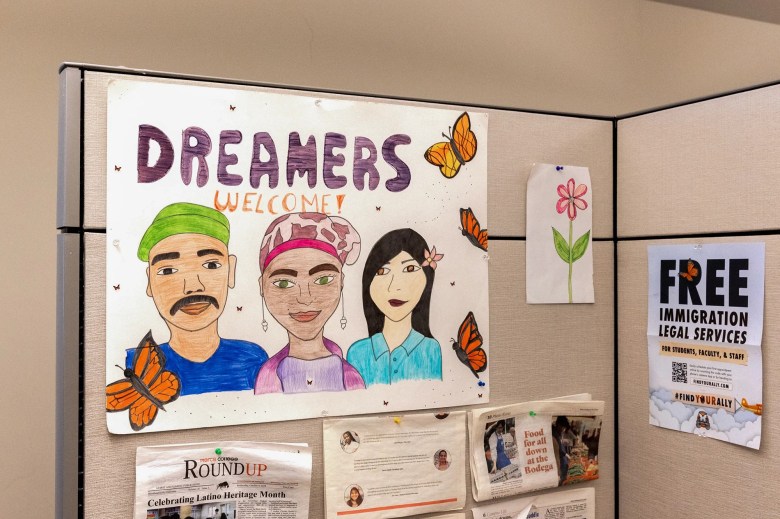Undocumented immigrants who were brought to the United States as children are set to lose their health insurance coverage less than a year after Dreamers were first permitted to enroll in Covered California health insurance.
When their coverage expires at the end of the month, over 2,300 Dreamers in California are forced to either find other health insurance or go without it. The federal Centers for Medicare and Medicaid Services, which regulates insurance exchanges, made the decision.
In order to allow Deferred Action for Childhood Arrivals (DACA) beneficiaries, sometimes referred to as Dreamers, to purchase insurance through the state and federally operated marketplaces, the Biden administration modified the definition of lawfully present for eligibility under the Affordable Care Act last year. That ruling was overturned by the Trump administration in June, and the modification was scheduled to go into force two months later.
The administration said in a statement announcing the marketplace adjustments that the policy aims to improve healthcare affordability and access while maintaining fiscal responsibility by stabilizing the risk pool, lowering rates, and reducing incorrect enrollments.
Covered California said last week that it was attempting to inform all DACA applicants that their coverage will expire on August 31 and that it would assist them in finding alternative insurance.
The Affordable Care Act has prohibited illegal immigrants from buying health insurance on the market since its inception. The exception became DACA recipients, who are permitted to remain and lawfully work in the United States under a 2012 program.
Hoped for a different outcome
Jessica Altman, executive director at Covered California, said the decision is extremely unfair to hardworking, tax-paying Californians who believed they would have health insurance for 2025 only to have it taken away eight months later. For DACA recipients, we had hoped for something different, but we have to follow federal law.
Dreamers will need to obtain insurance through their employers in the absence of the insurance marketplace, or if their salaries are sufficiently low, they may be eligible for Medi-Cal, the state’s low-income health care program. For instance, Dreamers who are self-employed or freelancers who make too much money to be eligible for Medi-Cal but not enough to afford the entire cost of a health plan are left in a difficult situation.
Getting financial aid is one advantage of registering for insurance through Covered California. It was anticipated that the federal government would have to pay between $240 million and $300 million annually to expand coverage to DACA recipients nationally.
Effect on the marketplace
Experts argue that removing coverage for young people—the majority of Dreamers are under 36—would have the reverse effect of the federal government’s stated goal of stabilizing the insurance risk pool and assisting in the reduction of premiums.
According to Arturo Vargas Bustamante, a professor at the UCLA Fielding School of Public Health, this is because when younger and healthier people enroll in insurance, their affordable coverage helps offset the high expense of covering sicker and older people.
Therefore, premiums tend to increase for everyone when fewer young individuals sign up for coverage. Then, according to Vargas Bustamante, sick individuals who truly need insurance pay the price.
Although recipients of the 13-year-old DACA program are not granted legal status, they are protected from deportation and are permitted to work. It is believed that around 150,000 DACA recipients reside in California.
Get neighborhood news in your inbox. It’s free and enlightening.
Become one of the 20,000+ individuals who receive breaking news alerts and the Times of San Diego in their inbox every day at 8 a.m.
Weekly updates from San Diego communities have also been provided! You acknowledge and agree to the terms by clicking “Sign Up.” Choose from the options below.
Red states quickly opposed President Joe Biden’s plan to cover DACA recipients through the exchanges. A group of 19 Republican attorneys general filed a lawsuit in federal court last summer in an attempt to block the expansion of the insurance marketplace to include DACA recipients. The rule’s implementation in those 19 states was halted by a federal court in North Dakota who concurred with the plaintiffs. All states are subject to the Centers for Medicare and Medicaid Services’ new rule.
A greater number of immigrants are anticipated to lose or discontinue marketplace coverage in the near future, with DACA recipients being the first group to do so. Beginning in 2027, the federal budget that President Donald Trump adopted this month will no longer provide marketplace financial aid to certain groups of lawfully present immigrants, such as refugees and asylum seekers. Many of these enrollees probably won’t be able to pay for their coverage without financial aid.
Starting the next year, the monthly premiums for all other individuals enrolled in Covered California plans may increase by $101 per month.
CalMatters is a nonprofit, nonpartisan news company that holds our officials accountable while providing Californians with articles that examine, clarify, and consider solutions to problems affecting their quality of life.

 by
by 

